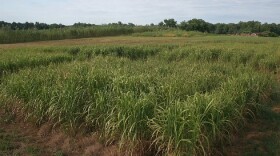This week, a delegation from England is touring Virginia and North Carolina, learning more about wood from area forests being used to fuel power plants in the UK. The European Union considers wood to be a sustainable energy source and gives countries credit for using it instead of coal, but critics here in Virginia say that’s a big mistake.
Sixty-two percent of Virginia is forest – land covered by trees and inhabited by birds and wildlife. It’s a delight to bird watcher Derb Carter, a senior attorney with the Southern Environmental Law Center, so he’s doing battle with people who think it’s okay to burn wood pellets from America in Europe. He says, “You’ve got a high energy facility to make pellets that require diesel fuel to get them here, diesel fuel to get them to Europe, and then we’re going to burn them over there and put more carbon in the atmosphere.”
The big player in this industry is a Bethesda-based company called Enviva. Executives there refused our request for an interview but argued, on paper, that its six plants use only leftover wood that can’t be turned into lumber. Charlie Becker is with the Virginia Department of Forestry. Becker says, “You’ll have some wood that may not be able to make into saw timber. It could be diseased. It could be small. The species could be wrong, so then they take that to places like pulp mills or pellet mills to be made into other products.”
Enviva also points out that new trees will replace the ones cut down – absorbing carbon from the atmosphere, so their product should be viewed as carbon neutral. Derb Carter is not convinced. He says, “That’s going to take 80-100 years to occur, and because it takes more wood than coal to create the same amount of energy, we’re actually going to be putting much more carbon into the atmosphere than we would if we burned coal.”
At the University of Virginia, Environmental Science Professor Deborah Lawrence adds that taking waste wood off the land depletes the soil. Lawrence says, “If you’re taking that residue and turning it into fuel, it’s not going into the soil to rebuild the soil.”
And with more than 66% of Virginia’s forests in private hands, Lawrence and Carter say there’s no guarantee that new trees will be planted or that woods will be allowed to regenerate naturally. Lawrence says, “In the East, most forest is on private land, and we the public have nothing to say about how people manage forests on private lands.”
Carter added, “And in fact we continue to lose forest at an alarming rate.”
In response to public complaints, Enviva is offering $5 million in matching funds to help non-profit groups protect environmentally sensitive forests.
One year ago, Enviva went public, submitting paperwork to the Securities and Exchange Commission, and that’s given opponents a new way to attack the company. Mary Booth, Director of the Partnership for Policy Integrity, says Enviva’s claim that its product is better for the environment than coal is bogus, and she’s organized a group of investors who want the SEC to step in. She says, “We rounded up 34 investment groups, and they signed a letter to the SEC which calls out this report on Enviva that we prepared as an example of why the SEC needs to start enforcing its climate guidance and pay attention to this issue.”
Booth says this case is important, because investors rely on the commission for accurate information, and plenty of publicly traded corporations claim to be green. “There are a lot of companies out there that are trying to make money and sell themselves as being a solution to climate change, and investors need to know whether that’s actually true,” says Booth.
The Securities and Exchange Commission refused to comment, but the Dutch government has issued new requirements for wood pellets from America. They must come from well managed forests and -- over a one year period -- produce 70% less carbon than coal.




